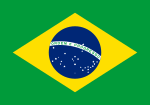 | |
| Ministry of Education | |
|---|---|
| Minister of Education | Milton Ribeiro[1] |
| National education budget (2017) | |
| Budget | 5.95% of GDP; 15.72% of total government expenditure |
| General details | |
| Primary languages | Portuguese |
| System type | Public (Federal,State,Municipal) & Private |
| Literacy | |
| Total | 91.73 |
Education policy in Brazil has been given importance by the federal and local governments since 1995.[2] At that time, the government of President Fernando Henrique Cardoso and the Brazilian Ministry of Education began to pursue three areas of national education policy:
- education finance equalization
- conditional cash transfers
- education results measurement[3]
According to the World Bank, these national education policies have tracked with global best practice, and implementation has been sustained and effective in improving performance and outcomes of education in Brazil. Though Brazil has made significant strides in improving labor force skills, Brazil is below average with respect to learning levels, secondary completion rates, and student flow efficiency, when compared to OECD and other middle-income countries.[3] In addition, non-attendance rates and drop-out rates have also been on the increase. Moreover, these factors are especially high in lower income areas where the quality of education largely remains below the expected levels.[4] These have been the recent targets of education policy.
- ^ "Ministros de Estado". Governo do Brasil. Retrieved 21 October 2020.
- ^ "Country Analysis Report: Brazil - In-depth PESTLE Insights". DataMonitor: 66. May 2010.
- ^ a b Human Development Sector Management Unit, Latin America and the Caribbean Regional Office (21 December 2010). "Achieving World Class Education in Brazil: The Next Agenda" (PDF). The World Bank. Archived from the original (PDF) on 6 July 2011. Retrieved 3 April 2011.
- ^ "Country Analysis Report: Brazil - In-depth PESTLE Insights". DataMonitor: 23. May 2010.